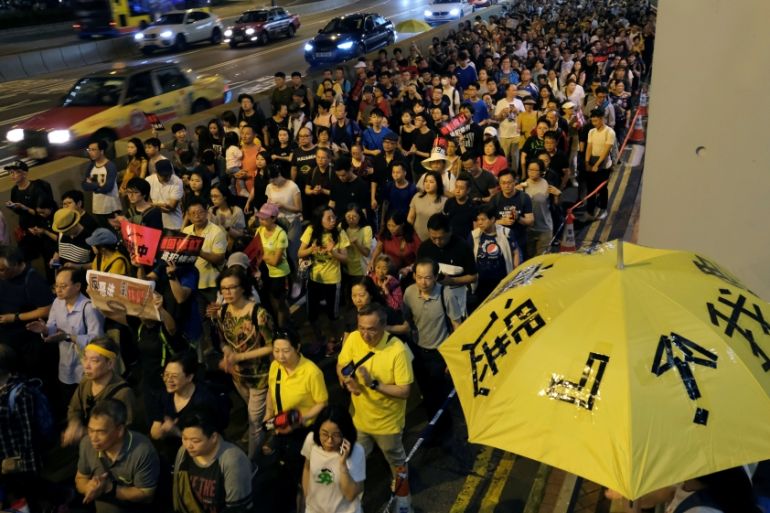Huge protest in Hong Kong against China extradition plan
Massive crowds carrying yellow umbrellas rally against legal changes that would send people to mainland China for trial.

Tens of thousands of people have marched on Hong Kong‘s parliament in opposition to proposed extradition rules that would allow criminal suspects to be sent to mainland China for trial.
Many of those taking part in Sunday’s protest carried yellow umbrellas, recalling Hong Kong’s massive 2014 pro-democracy protests, the leaders of which have been sentenced to up to 16 months in prison.
Opponents of the proposal fear a further erosion of rights and legal protections, which were guaranteed under the city’s handover from British colonial rule to Chinese sovereignty in 1997.
Participants marched peacefully for more than three hours through the shopping and business districts of Causeway Bay and Wanchai, with thousands staying on into the evening outside the Legislative Council and government headquarters.
Police said 22,800 people marched at the peak of the procession, but organisers estimated that 130,000 turned out – making it one of the largest street protests in the city for several years.
Observers said the turnout dwarfed an earlier protest against the plan last month.
Demonstrators carried placards accusing Hong Kong leader Carrie Lam of “selling out” Hong Kong and called on her to resign.
Some protesters dressed as Chinese mainland police officers guarding another demonstrator standing behind a portable red cage. One held up a sign that said: “President Xi Jinping, no legalised kidnapping of Hong Kong people to China”.
![Demonstrators hold yellow umbrellas, the symbol of the Occupy Central movement, during the protest to demand authorities scrap a proposed extradition bill with China [Tyrone Siu/Reuters]](/wp-content/uploads/2019/04/d3d6c2b297e24d1c906cb22b9ef80bca_18.jpeg)
‘Unjust legal system’
Leung Kwok-hung, a veteran activist and former legislator, said the government’s move risked removing Hong Kongers’ “freedom from fear”.
“Hong Kong people and visitors passing by Hong Kong will lose their right not to be extradited into mainland China,” he said. “They would need to face an unjust legal system on the mainland.”
Roland Lo, a 49-year-old protester, said Hong Kong and China have “completely different legal systems”.
“Creating a loophole that could mean a Hong Kong person gets extradited to China to face prosecution there, that completely destroys the guarantee of human rights and legal protection of one country, two systems.”
Lam and other government officials are standing fast by their proposals, calling them vital to plugging long-standing loopholes.
Under the changes, the Hong Kong leader would have the right to order the extradition of wanted offenders to China, Macau and Taiwan as well as other countries not covered by Hong Kong’s existing extradition treaties.
![Pro-democracy supporters and activist Lee Cheuk-yan (front) hold yellow umbrellas and placards to support leaders of the Occupy Central activists [Tyrone Siu/Reuters]](/wp-content/uploads/2019/04/e06a79fe65f148a89a50fef059fe668c_18.jpeg)
As a safeguard, such orders – to be issued case-by-case – can be challenged and appealed through the city’s independent legal system. Government officials have said no one at risk of the death penalty or torture or facing a political charge can be sent from Hong Kong.
The proposals could be passed into law later in the year, with the city’s pro-democratic camp no longer holding enough seats to block the move.
The government justified the swift introduction of the changes by saying they are needed so a young Hong Kong man suspected of murdering his girlfriend in Taiwan can be extradited to face charges there.
Under pressure from local business groups, they earlier exempted nine commercial crimes from the new provisions.
Sunday’s march comes amid renewed calls for deeper electoral reforms stalled five years ago after the Occupy Central protests.
Four leaders of the movement were last week sentenced to jail terms ranging from eight to 16 months, part of a group of nine activists found guilty after a near month-long trial.
|
|